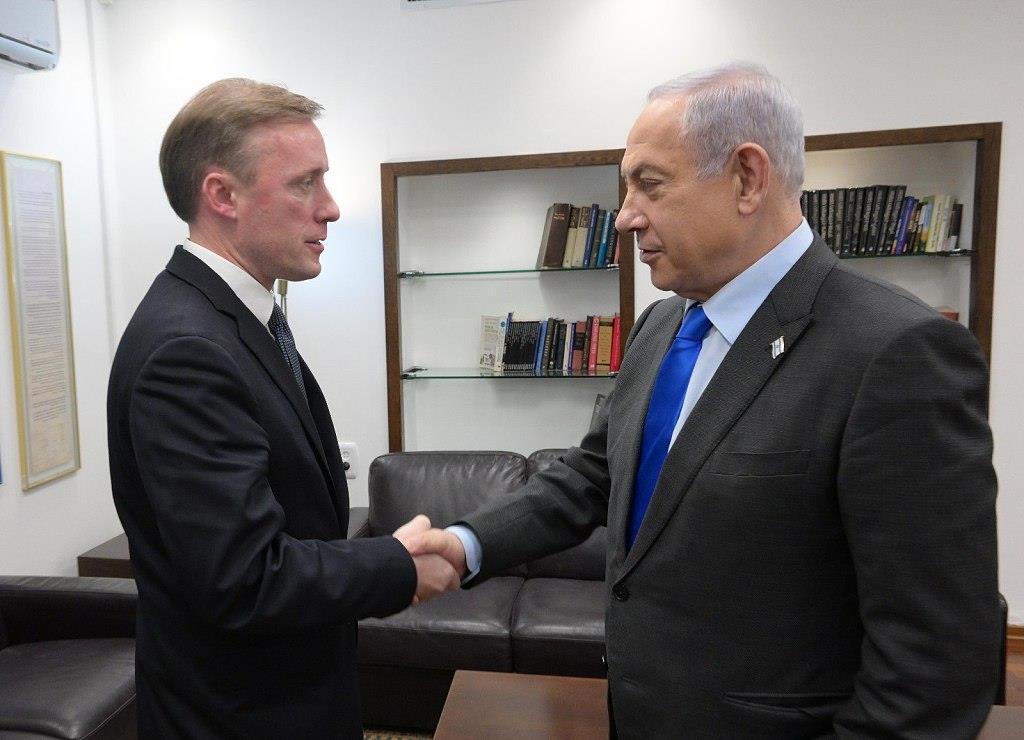US Presidential National Security Assistant jack sullivan visited Israel on 14th and met with Israeli Prime Minister Benjamin Netanyahu. With regard to the Israeli military operations in the Gaza, the United States called on Israel to adjust its strategy and turn it into a "low-intensity, high-precision" attack.
The United States and Israel have different opinions.

△ On December 14th, local time, Israeli Prime Minister Benjamin Netanyahu (right) met with US President’s National Security Adviser jack sullivan (left) in Tel Aviv.
John Kirby, strategic communication coordinator of the White House National Security Council, said that Sullivan discussed with Israel the "possible transformation" of Israeli military operations in the Gaza and called on Israel to turn the current "high-intensity" military operations into "low-intensity" precision strikes, but no timetable was set.
A senior official of the U.S. government, who asked not to be named, told Reuters that Sullivan’s meeting with Israel and previous high-level meetings and phone calls between the U.S. and Israel did involve discussions on the change of Israeli military strategy, and the U.S. side was more inclined to turn the current "fast-paced, high-intensity" military operations to clear the Palestinian Islamic Resistance Movement (Hamas) into "low-intensity" operations such as targeting high-value targets and launching raids based on intelligence.
US President Barack joseph robinette said on the 12th that Israel is losing the support of the international community because of its indiscriminate bombing of Gaza. Biden was asked on 14th whether he hoped the Israeli army would end its military operations before the end of the year. He replied that he hoped the Israeli army would pay more attention to the safety of civilians, not stop attacking Hamas, but "be more careful".
However, Israel did not give a clear statement on whether to adjust its military action strategy. During the meeting, Israeli Defense Minister Joyaf galante told Sullivan that the Israeli military action against Hamas "will continue for several months", and Israel will eventually win and destroy Hamas.
The Israeli Prime Minister’s Office said in a statement on the 14th: "We will continue to fight more resolutely than ever before until we win an absolute victory in destroying Hamas."
The Israeli army continued its offensive

△ On December 15th, local time, after the Israeli air raid, smoke billowed over Khan Younis, a city in the south of Gaza.
On 14th, the Israeli army continued its military operations in the Gaza, not only intensively bombing several urban areas such as Zaitong in the northern city of Gaza, but also attacking targets such as Khan Younis and Rafah in the southern city. Health authorities in Gaza said that at least 111 people were killed in the air raid that day.
Although the Israeli army declared last month that it had basically achieved its military objectives in the northern part of the Gaza Strip, the fighting did not stop. On the 13th, an Israeli army was ambushed in the residential area of Shajaya in the east of Gaza, killing nine people. On the 14th, the Israeli army claimed to have destroyed an Hamas stronghold in a school in Shajaya. In the Gebali refugee camp, Israeli troops attacked a hospital. Health authorities in the Gaza said that the Israeli army detained and abused hospital staff and prevented them from treating the wounded.
Earlier this week, Israeli troops invaded the center of Khan Younis, and the whole city was bombed. The Israeli army said on the 14th that it destroyed two tunnel shafts, a rocket launching site and a weapons storage facility in Khan Younis. A number of health officials in the Gaza said that the Israeli army attacked a building in Khan Younis early on the 15th, killing four people and injuring many others, including two children.
According to the statistics of the health department in the Gaza, since the new round of Palestinian-Israeli conflict broke out on October 7, Israeli military operations in the Gaza have caused more than 18,600 Palestinian deaths and more than 50,000 injuries.
Reuters reported that almost all residents in Gaza were displaced due to the continuing conflict, and many people were forced to move several times. A large number of people are starving. Some people beg for a bite of bread, some people buy a can of beans at 50 times the usual price, and some people stop trucks carrying aid to beg for food.
Philip Lazzarini, Director-General of the United Nations Relief and Works Agency for Palestine Refugees in the Near East, said: "There are more and more people we meet who have nothing to eat for one or two or even three days."